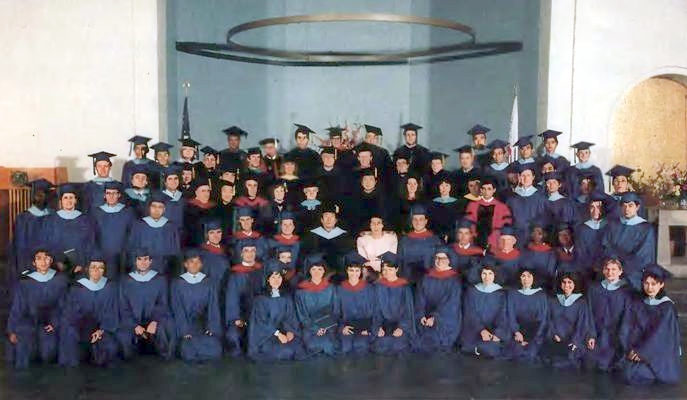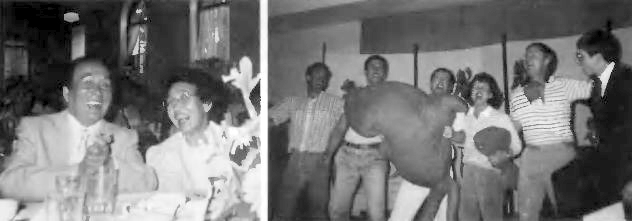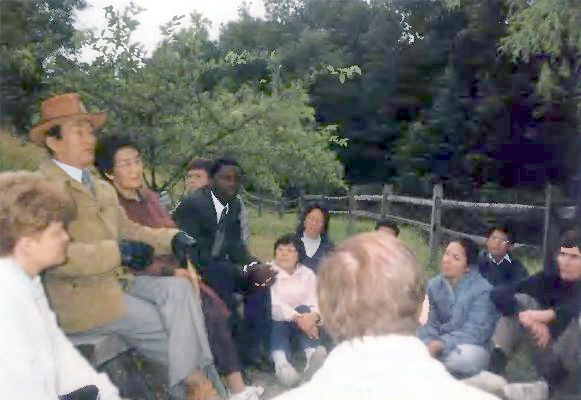![]()
The Words of David S. C. Kim
|
|
The Words of David S. C. Kim |

Forty-seven
students graduated from the Unification Theological Seminary on June
30, 1988
Commencement exercises for the 12th class of the Unification Theological Seminary were held at Barrytown on June 30, 1988. Thirty-three students graduated from the Religious Education Program and 14 from the Divinity Program. Father expressed his commitment to and hope for the 47 students both through his Commencement Address, delivered in his absence by President David S. C. Kim, and in an intimate talk given to the graduates on the day before the ceremony.
In his Commencement Address Father emphasized how necessary it was for the future well-being of America that the graduates "revive the 'original America' in the founding fathers' spirit of the Judeo-Christian heritage in this country. You must be dedicated to the remaking of individuals, communities, this nation, and the world according to the original ideals of God."
He went on:
"First of all, in order to find the true love, happiness, and peace desired by our original minds, you must plunge yourselves into this troubled world and work there for God. You do this by sacrificing yourselves through total investment and commitment. Perseverance, self-sacrifice, and the road of suffering and pain are the only ways to bring success in your responsibility as religious leaders.

President
and Mrs. David S.C. Kim enjoy a hilarious skit performed by the
students at the closing banquet on Graduation Day.
Secondly, you not only give help and service to others in an unconditional way, but by this path of living sacrifice you will inherit the course of 'Messiahship,' becoming small Messiahs in your homes and communities....
Thirdly, you must educate and guide people to not only believe in God's will, but to live it in their everyday lives. We must develop a 'practical application' movement....
Your sacred mission is to educate others to become your successors. This means educating a second generation who will be heirs of the coming ideal world, thus ensuring that God's will continues after you. Your success will not be complete if you have no successors to take over your mission. Therefore, your special effort must be to guide and raise up a second generation in your lifetime.
This nation of America should be renewed, not just through a spiritual revolution, but through action concerned with applying God's will to the practical solution of its problems. If you accomplish this task, you graduates will become the pride of both your Unification movement and your nation. You will not be simply ministers, leading secluded lives, but men and women who will save this nation and world according to God's will and plan for restoration.
Have confidence and put all your energy into bringing about God's ideal, never abandoning the heart of God, who desires to accomplish His will through you.

On
the day after graduation, President and Mrs. Kim hold one of their
traditional outdoor morning chats with the students.
UTS President David S.C. Kim then presented his remarks:
"In providential history, there were just a few individuals -- figures like Abraham, Moses, and Jesus -- who were eventually responsible for leading millions of people to God. So from God's point of view, quality is more important than quantity."
"I wish to point out that after you graduate you will not have to worry about what you are going to do. You are automatically "hired" already, without having to go through any intensive, competitive struggle or search to find a job. In this way, I congratulate you on your 'full employment!"'
Graduate Nico Wealer included these words in his response:
"Rev. Moon has taught us that the purpose of education is not to enable us to earn a living, but instead to shape a life of goodness. The purpose of education is the 'marriage of life,' the unity and balance between thought and action.
We need to remember the source, but we must also appreciate our faculty of noble individuals. It is not an easy task to establish a school of academic excellence, a center for ecumenism and interfaith activities, and an institution of higher learning that teaches and preserves the very ideals that have guided and shaped civilization."
Of the 47 graduates, 19 were from the United States, 17 from Japan, four from England, two from West Germany, and one each from New Zealand, Portugal, Africa, Taiwan, and Luxembourg. During the summer, 35 will be participating in Ocean Challenge in Gloucester, Massachusetts, while the other 12 will be witnessing in upstate New York, as part of a 40-day leadership training program.
For any institution of higher learning in New York State, the first step in becoming accredited -- that is, having official sanction to grant academic degrees -- is to obtain a charter from the New York State Board of Regents. UTS applied for a charter during its very first year of operation, 1975-1976, but this was denied at the beginning of 1978. The Seminary reapplied, and finally, in November 1986, the Board of Regents granted UTS a provisional charter, which took effect on January 2, 1987.
Once a charter is obtained, a school must be evaluated by its peers in order to be officially accredited. In October 1987, UTS applied for evaluation to the Middle States Association of Colleges and Schools (MSA), a voluntary association of educational institutions. According to MSA's requirements,
"Accredited status constitutes a statement to the general public that an institution has clearly defined and appropriate educational objectives, has established conditions under which their achievement can reasonably be expected, appears in fact to be accomplishing them substantially, and is so organized, staffed, and supported that it can be expected to continue to do so...."
In a letter to President David S.C. Kim, the MSA agreed on June 22-23, 1988, to grant Candidate for Accreditation status to the Unification Theological Seminary. During the candidacy period, the Seminary will file semi-annual interim reports to the MSA, and following their submission UTS will receive visits by an appointed consultant of the MSA Commission. The Seminary will undertake a self-study, be evaluated, and receive an accreditation decision within six years of admission to candidacy.